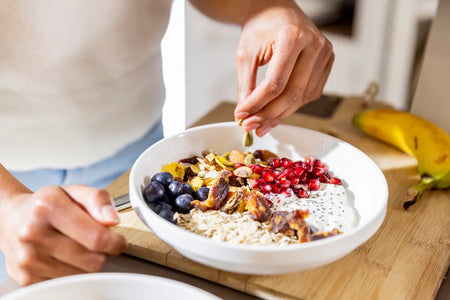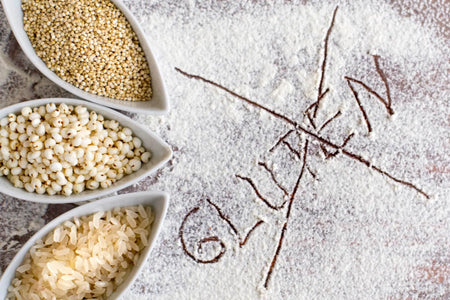Pregnancy
Pregnancy and breastfeeding require a balanced diet to provide optimal nutrition for you and your baby. Oats are a perfect companion: They provide fibre, plant-based protein, iron and magnesium. Learn how to incorporate oats into your diet to stay fit and healthy during these special phases.

Staying fit during pregnancy and breastfeeding: harnessing the power of oats
The moment you find out you're pregnant is priceless. From now on, a lot changes – and a balanced diet becomes essential for your well-being and your baby's healthy development. Oats are your perfect companion: Rich in fibre, plant-based protein, iron and magnesium, they give you and your baby exactly what you need.
Want to know more? Here you'll find the most important information about a balanced diet during pregnancy and breastfeeding. And if you have any further questions, please contact us.
Questions & answers about pregnancy – FAQ

What can you do about morning sickness?
Morning sickness is a part of pregnancy for many expectant mothers. Some only experience it in the morning, while others struggle with it throughout the day. But don't panic – in most cases, it goes away on its own after a few weeks. Our insider tip that can help: A spoonful of Regular Rolled Kölln Oat Flakes, dry and pure, to snack on. Oat flakes are mild, easy to digest and gentle on the stomach – perfect if you're not feeling well enough to eat liquid or strongly spiced foods.
How do you best care for yourself and your baby?
Forget about "eating for two" – what you eat is much more important than the amount! During pregnancy, your body needs more vitamins, minerals and protein, while sugar and fat should be eaten in moderation. From the sixth month onwards, your calorie needs increase slightly – about 400 kilocalories (kcal) more per day. And while breastfeeding? Not only do you need an additional 400 to 600 kcal, but you also need at least 0.5 litres more fluid per day. Sounds like a challenge? No stress – with a breakfast that provides you with all the nutrients you need, you'll start the day well prepared. So, grab your spoon, dig into your oat flakes and let's get started!
Coffee and similar: What is allowed during pregnancy?
Good news for all coffee lovers: Two to three cups a day are perfectly fine! Tea is also fine – as long as you don't overdo it. Caffeinated soft drinks are a different story: They often contain more caffeine than you think and should therefore be the exception. Important: Alcohol and cigarettes are absolute no-gos! Both can cause serious developmental and organ damage in your baby – so it's best to cut them out immediately.
What to do if you feel tired or have circulatory problems during pregnancy?
Suddenly everything feels exhausting? Extreme fatigue and circulatory problems are typical signs of pregnancy. But hey – your body is doing great things, so consciously take more rest time. What helps? Regular, small meals ensure stable blood sugar levels and give you energy. And when all else fails: Get on the couch, put your feet up and take a deep breath!
How can I cleverly outsmart cravings?
Sweet, salty or sour – and preferably right away? Cravings are as much a part of pregnancy as a baby bump. Hormonal changes and fluctuating blood sugar levels are the reason. The best strategy: prevention! Several small meals spread throughout the day prevent cravings from hitting in the first place. And if they do? Reach for fruit, vegetables or a small portion of cereal – these curb the craving and provide you with valuable nutrients.
What can I do about heartburn during pregnancy?
More gastric juice, less space – no wonder heartburn is a common problem during pregnancy. Our tip: Eat lots of small meals instead of large portions. Also: Don't lie down immediately after eating. Lying down makes it easier for stomach acid to flow back into the esophagus. And if all else fails? Warm porridge can soothe your stomach and save your day.

Weight gain during pregnancy: How much is normal?
In the first few weeks, you may even lose some weight due to the nausea – this is completely normal. However, from the second half of your pregnancy onward, steady weight gain is important. As a rough guide, expect to gain about four to five kilograms in the first half and about eight to ten kilograms in the second half. The bottom line is that you'll gain about 12 to 15 kilograms – but depending on your starting weight, it could be a little more or less.
Does fibre help with digestion?
Does less belly space mean a tired gut? Yes. That's exactly what happens during pregnancy! To keep your digestive system in check, a high-fibre diet is invaluable. Focus on wholegrain products, oat flakes, fruits and vegetables – and remember to drink plenty of fluids! Fibre only works effectively when combined with plenty of fluids.
Meat-free during pregnancy and breastfeeding?
Absolutely doable! As long as you include milk, dairy products and eggs in your diet, you'll be well nourished. Iron is particularly important – it's found in wholegrain products, legumes and green vegetables, for example. Pro tip: Iron is better absorbed when combined with foods rich in vitamin C – so muesli + orange juice or wholegrain bread + peppers = dream team! Since many women develop an iron deficiency toward the end of their pregnancy anyway, your doctor will regularly check your levels and intervene with supplements if necessary.










